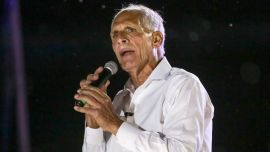Argentina’s monthly inflation slowed for a second consecutive time as the impact of December’s large peso devaluation fades and President Javier Milei’s austerity measures push the economy into recession.
Consumer prices rose 13.2 percent in February from a month earlier, below economists’ expectations of a 15 percent gain, according to government data published Tuesday. On a yearly basis, prices surged 276.2 percent, the fastest pace since South America’s second-biggest economy exited hyperinflation in the early 1990s.
Central Bank Governor Santiago Bausili announced a surprise rate cut to 80 percent from 100 percent late Monday, citing a “descending trajectory” in retail prices despite the “strong statistical drag” of high monthly inflation, alongside the steady rebuilding of international reserves. The inflation results reflect a lower pass-through than initially expected from December’s currency intervention, policymakers said.
After taking office, Milei devalued the official peso exchange rate by 54 percent, instituted a two percent crawling monthly peg and lifted hundreds of price freezes. But the austerity measures also wiped out social security spending and inflation-adjusted wages, sharply curbing consumption and deepening the economic recession.
While inflation has been easing since its 25 percent monthly peak in December, progress is expected to slow as Milei continues to eliminate generous state subsidies that were artificially restraining energy bills and transport prices.
March is expected to be a particularly harsh month as children return to school and unions negotiate salary increases, according to Gabriel Caamano, an economist at Buenos Aires-based Consultora Ledesma.
The Central Bank’s doveish policy move contrasts with guidance from the International Monetary Fund in its most recent review of Argentina’s US$44-billion programme, where staff argued “the monetary policy stance would need to be tightened to support money demand and disinflation.” The fund projects a 2.8 percent contraction in Argentina’s economy this year, followed by five percent growth in 2025.
related news
by Manuela Tobias, Bloomberg






















Comments